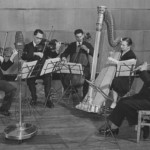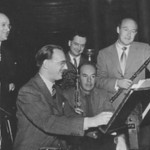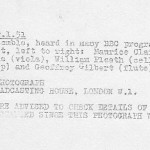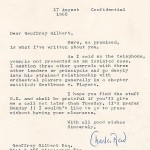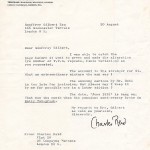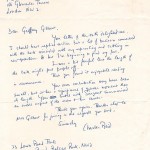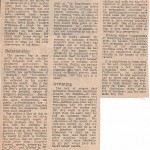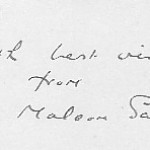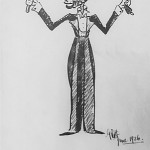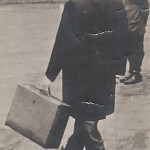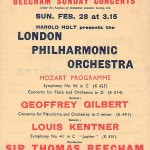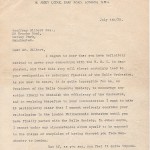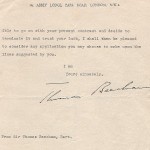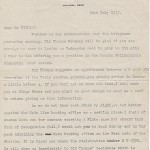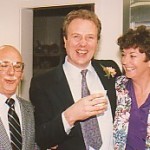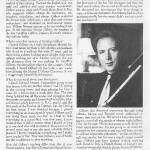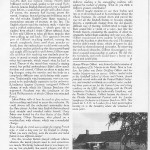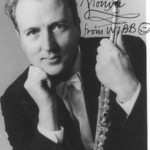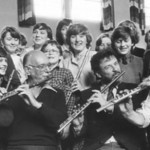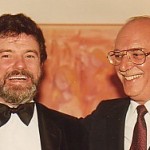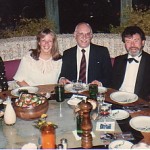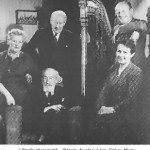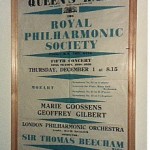The Wigmore Ensemble
Founded in 1948, The Wigmore Ensemble was comprised of eighteen members, each an outstanding soloist in his own right:
- Geoffrey Gilbert, Principal Flute – Royal Philharmonic Orchestra
- Terance MacDonagh, Principal Oboe – RPO
- Jack Brymer, Principal Clarinet – RPO
- Gwydion Brooke, Principal Bassoon – RPO and Philharmonia Orchestra
- Dennis Brain, Principal Horn – Philharmonia Orchestra
- Alan Civil, Principal Horn – Philharmonia Orchestra
- Richard Walton, Principal Trumpet – London Philharmonic Orchestra
- Maurice Clare, Concertmaster – Boyd Neel Orchestra
- Jean Pougnet – Concertmaster – LPO
- Granville Jones, Violinist/Director – Philharmusica of London
- Thomas Carter, Principal Violinist – Philharmonia Orchestra
- Frederick Riddle, Principal Viola – RPO
- William Pleeth, Soloist and Professor of Cello – Guildhall School of Music and Drama
- Anthony Pini, Principal Cello – Royal Opera House Orchestra, Covent Garden
- Eugene Cruft, former-Principal Double Bass – BBC Symphony Orchestra
- Wilfred Parry, Piano soloist and chamber music performer
- Maria Korchinska, Harp – past member of the Bolshoi Opera Orchestra, Moscow
- James Blades, Percussion expert and lecturer
Founded by Geoffrey Gilbert, the Wigmore Ensemble was in existence for twenty-one years and the group premiered many chamber music works by young British and European composers. Unfortunately the recording companies of that period were not interested in the Ensemble, so there are no commercial recordings in existence.
“During these years we played many hundreds of concerts in England, Ireland, Scotland and Wales besides regular appearances at musical events and festivals on the continent of Europe. Our broadcast performances for the BBC were also a prominent part of the broadcast music schedule each year.” — Geoffrey Gilbert
~ SOUVENIRS ~
Sir Malcolm Sargent
At a rehearsal of “Young Person’s Guide” by Benjamin Britten, when Gilbert was principal flute in the BBC Symphony Orchestra, Sargent was obviously in one of his moods. The flute parts for both first and second flute are very fast and very tricky, and for some reason Sargent decided to pick on the flute section that day. The second flutist was a young player from Australia called Douglas Whittaker, whose confidence was draining away in the light of the constant requests to “play it again”. Despite Gilbert’s assurances that whatever the problem was with the passage he would fix it during the afternoon before the performance, Sargent kept asking them to repeat the passage over and over again.
Gilbert was beginning to become very cross and protective of his second flute, so after they had played the passage eleven times by themselves in front of the whole orchestra Gilbert rose up and left the platform in disgust. He gave his notice immediately, to the distress of the management as he was one of their star players, and returned home to tell Marjorie. To put it mildly, she was not thrilled by the revelation that her husband had quit one of the best jobs in the business but she supported him, of course.
Unfortunately, Sargent seemed to be drawn to Gilbert like a magnet and whenever they were in close proximity Sargent would be sure to approach Gilbert, perhaps in the hope of making amends. Despite a huge bouquet of flowers, which arrived at the hospital when Gilbert was in for an operation (Marjorie kept the card for fun) and various friendly overtures, Gilbert eventually refused to appear with Sargent in public, but relented when the RPO needed him to tour in Russia with the conductor after Sir Thomas’ death. Gilbert returned to England and said to Marjorie, “if that is a representation of British music today, I am putting away my flute” and other than his guest appearances with the LSO at the behest of their persuasive manager Ernest Fleishman, his orchestral career was over.
Gilbert’s relationship with the conductor Sir Malcolm Sargent was a strange one, but he was not alone in finding Sargent difficult to deal with and other musicians had similar problems. Gilbert’s famous “fight” with Sir Malcolm has been written about in a book by Charles Reid called The Strange World of Sir Malcolm Sargent.
~ SOUVENIRS ~
Sir Thomas Beecham
If Sir Malcolm Sargent was the conductor that Gilbert liked the least, Sir Thomas Beecham was the one he loved the most. They met when Gilbert was very young and an affectionate relationship developed over many years.
It was always a thrill to be invited by Sir Thomas to play a concerto with the orchestra, and the day after the Gilberts were married, Geoffrey was scheduled to play the Mozart Flute Concerto with the LPO in Paris. Leaving the wedding party in Belfast they took the train to Dublin and the couple flew to France. A first flight for Marjorie and an exciting beginning to long and happy marriage.
Before Sir Thomas died at an advanced age he invited his principal players with the RPO to go to his flat in London to say goodbye. It was a touching gesture and a very poignant occasion.
~ SOUVENIRS ~
William Bennett
One of the world’s foremost musicians, William Bennett is distinguished by his unique tone, wide range of colors and consummate musicianship, and has inspired generations of musicians. He studied with Geoffrey Gilbert, Jean-Pierre Rampal and the legendary Marcel Moyse. His acclaimed solo and chamber recordings represent a varied repertoire, covering the Baroque through contemporary periods.
A gifted and inspirational teacher, his services to music were recognized by the Queen of England in 1995 with the presentation of an OBE award.
~ SOUVENIRS ~
Eugene Ormandy
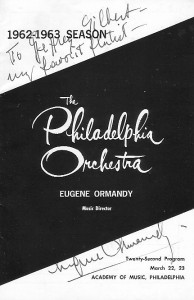
Upon William Kincaid’s retirement as Principal Flute from the Philadelphia Orchestra in 1960, an interesting set of circumstances took place which led to Gilbert being offered the position of principal flute. After hearing a radio broadcast while on vacation in Switzerland, Eugene Ormandy called the radio station to identify the flutist on the broadcast and subsequently contacted Gilbert through the British Musicians Union.
Ormandy issued Geoffrey and invitation to play for him, and an audition took place some time later in London. Gilbert was offered the position of Principal Flute with the Philadelphia Symphony Orchestra and signed part of the contracts to ensure his position. One month before he was to leave England, however, the American Federation of Musicians in Philadelphia refused to authorize or sign the contract agreement because Gilbert was not an American citizen. Consequently, James Pellerite held the position for one year after Kincaid retired. Murray Panitz succeeded Pellerite in 1961, and held the position until his sudden death in April of 1989.
Sir James Galway
Sir James Galway is regarded as both a supreme interpreter of the classical flute repertoire and a consummate entertainer whose appeal crosses all musical boundaries. Through his extensive touring, over fifty best-selling RCA Victor albums and his frequent international television appearances, Galway has endeared himself to millions worldwide.
Galway studied with Gilbert at the Guildhall School of Music in London after attending the Royal College. Gilbert had heard him play when he was very young in his home-town of Belfast, Northern Ireland, and immediately recognized an extraordinary talent. Over the years the two men became great friends and Gilbert was intensely proud and delighted with Galway’s brilliantly successful career.
In October 1998 Galway was kind enough to offer to perform a concert in Daytona Beach to raise money for Gilbert’s Endowment Fund. Accompanied by his wife Jeanne and a starry group of the world’s greatest musicians the concert was a fabulous success and did indeed raise a great deal of money. These funds are held by the Florida Flute Association and a Gilbert Scholarship is now awarded every year.
~ SOUVENIRS ~
Eugene, Leon and Marie Goossens
The Goossens were a very famous English family of musicians. Leon Goossens was already well established as Britain’s premier oboist, and was about eleven years older than Geoffrey when the young principal flute arrived from Liverpool to join the London Philharmonic Orchestra in 1937. Leon’s sisters, Sidonie and Marie were both harpists, and his brother Eugene was a well-known conductor.
The two musicians got on like a house on fire and Leon was very helpful and supportive of the 25 year old flutist. When war was declared in 1939, Geoffrey volunteered for the army but Leon, because of his age, was immune from having to join up. Six weeks before Marjorie, aged 23, had given birth to their first child, Monya, but with the prospect of the war looming, having to live in London was a terrifying prospect. Leon didn’t hesitate to extend the hand of friendship. While Geoffrey moved into Wellington barracks, Leon invited Marjorie and Monya to the safety of his country house where they sheltered until Geoffrey, as a member of the Coldstream Guards Band, was able to live at home in their London flat.
By a strange quirk of fate, when Monya returned to England from USA and joined the Academy of St. Martin in the Fields in 1987, the first event she was asked to arrange was Leon’s Memorial Service at Westminster Abbey. Although a very sad occasion, it was a wonderful opportunity for Monya to do something for Leon and the Goossens family.
~ SOUVENIRS ~
Rutland Boughton
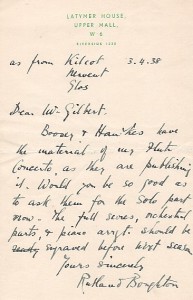
Composer Rutland Boughton came to prominence in 1914 when, together with Reginald Buckley, he began to put together his ideas of creating an artistic community centered around a purpose built theater. With the support of such eminents as Elgar, Beecham, Vaughan Williams and George Bernard Shaw he produced well over 300 staged performances with tremendous success. He was best known for his “Birth of Arthur” and the “Immortal Hour both first proSduced at the Assembly Rooms in Glastonbury.
Nadia Boulanger
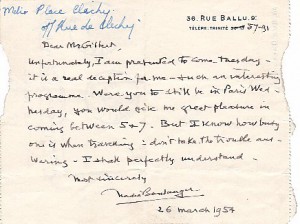
Nadia Boulanger was responsible for the musical training of a generation of distinguished composers from Europe and America. Better known as a teacher and conductor than as a composer she was greatly admired by Gilbert.
Julius Baker
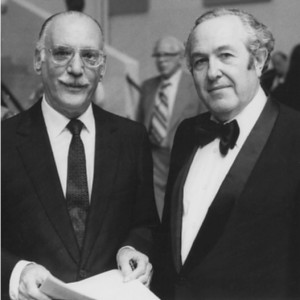 One of the great American flute players of his generation, Julius Baker was for many years Principal Flute in the New York Philharmonic Orchestra. He was a great friend and colleague.
One of the great American flute players of his generation, Julius Baker was for many years Principal Flute in the New York Philharmonic Orchestra. He was a great friend and colleague.
Sir John Barbirolli
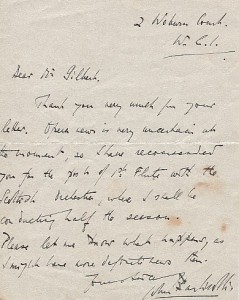
The Barbirolli’s were personal friends and in particular, Lady Barbirolli (Evelyn Rothwell), with who Gilbert played many concerts in freezing cold churches. Gilbert was fascinated to discover that Lady B. kept warm on these occasions by wearing a complete set of men’s woolen “combinations” under her evening dress. Sir John is one of the well-known conductors of this century.
Jean Michel Damase
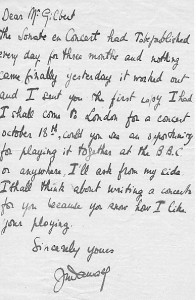
Jean Michel Damase was a dashingly handsome pianist and composer whose works were premiered in England by the Wigmore Ensemble, as were many works by French composers including Debussy, Ravel, Ibert, and Poulenc.
Jean-Pierre Rampal
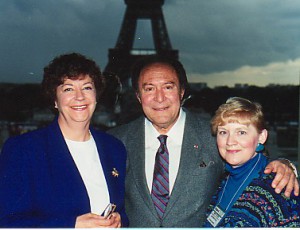
One of the greatest flutists of this century, Jean Pierre Rampal was the first flute player in history to attract international attention and large audiences comparable to those of virtuoso pianists and string players. From the very beginning, his career was key to restoring the instrument to the exalted position it held during the eighteenth century.
Monya was asked to present Jean Pierre with a Life Achievement Award in Paris by an American Association of College and University Presenters. It was a wonderful reunion for Monya and Rampal was so gracious about Geoffrey’s career. They were great friends and never missed an opportunity to get together, playing duets and talking endlessly about flutes when ever time permitted.
Ralph Vaughan Williams
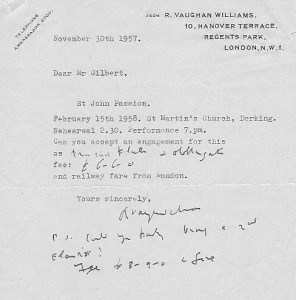
One of the greatest composers of this century, it is not necessary to list Ralph Vaughan Williams‘ many wonderful achievements. Gilbert was very fond of him and played for many years at Vaughn Williams’ festival in Surrey. As the years passed, Vaughn Williams grew a little hard of hearing, but by that time the players knew the music so well that it didn’t matter.

